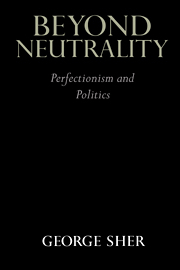10 - Conclusion
Published online by Cambridge University Press: 14 November 2009
Summary
All the elements of my argument are now in place. In the book's first part, I rejected the view that governments must remain neutral toward competing conceptions of the good, while in the second, I defended one conception as superior to others. There is, I argued, a strong case for the traditional perfectionist view that, for example, knowledge, excellence, and virtue make people's lives better, and that the best lives contain them in abundance. The obvious conclusion, and the one that in fact I want to draw, is that governments and individual political agents often have ample reason to promote such lives.
In saying this, I mean to imply neither that perfectionist values are the only proper grounds for political decisions nor that they should dominate all others. We often legitimately use politics to further our private interests, as when we vote for candidates who will create jobs in our district or protect our health insurance; and even when voters or legislators take a larger view, their reasons need not be perfectionist. They may instead act to maintain order, to further the provision of public goods, or to increase the efficiency, justice, or humaneness of the state's arrangements. In addition, legislators may support policies whose wisdom or justice they question in deference to their constituents' wishes or in order to secure the support of fellow legislators on more important issues.
- Type
- Chapter
- Information
- Beyond NeutralityPerfectionism and Politics, pp. 245 - 248Publisher: Cambridge University PressPrint publication year: 1997



